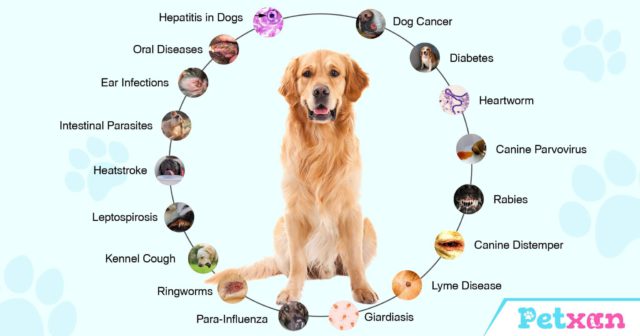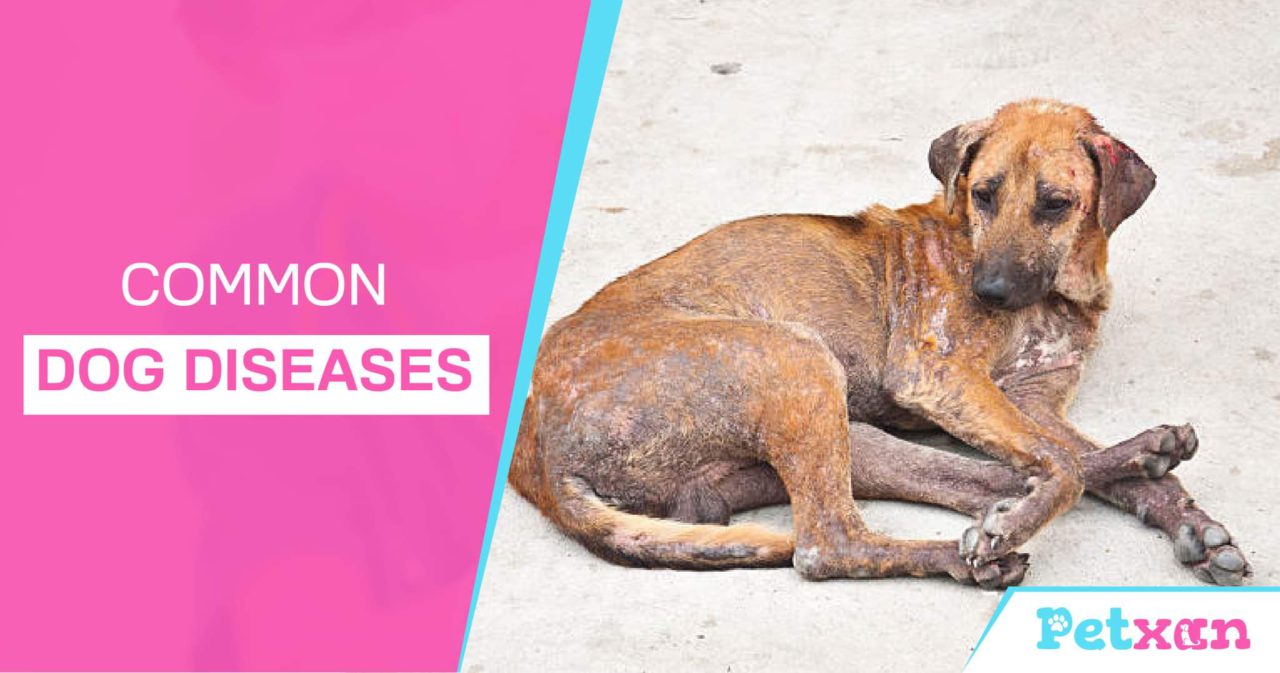Being a pup parent doesn’t mean taking your pup on short walks and posting good pictures on social media with your four-legged companions. You need to stay updated about the various common dog diseases too. And along with their proper care and health, knowing about common dog diseases should be your priority, and understanding the causes, symptoms, and preventive measures should be on the prioritized bucket list.
Without any delay, let’s dig into the most common dog diseases that your pets may be prone to. Some breeds are prone to some diseases while all breeds can also suffer from common dog diseases. Here, we will discuss the 17 major common dog diseases that your dogs may suffer from. So, keep pupdated and take immediate action if you have any doubts about the diseases of your pets.
Common Dog Diseases
1. Dog Cancer
We normally know cancer as a disease where there is the uncontrollable growth of the cells or the invasion of the cells that surround the tissue spreading over the other areas. Cancer is limited to only one area just like a tumor or it may spread throughout the body as well.
Causes: Both hereditary and environmental factors
Symptoms: Swelling, persistent eyes, abnormal discharge from any parts of the body, rapid weight loss, lethargy, loss of appetite, bad breath, difficulty in breathing, urinating and defecating, tarry stools, sudden lameness, lumps
In fact, cancer is more common in older dogs and certain breeds like Great Danes and Saint Bernards are more prone to suffer from bone cancer. Also, Golden Retrievers, Boxers, and Boston terriers are more likely to suffer from cancer.
Surgeries, chemotherapy, radiation, immunotherapy, and other medical treatments depend upon the type and stage of cancer.
2. Diabetes
Diabetes is often caused due to lack of insulin, a hormone secreted by the pancreas, or when the being is unable to utilize the hormone normally elevating the blood sugar causing several health complications like hyperglycemia.
Causes: Genetics, Obesity, Chronic pancreatitis, Abnormal protein deposits in the pancreas
Symptoms: Increase in water consumption, Weight loss, Change in appetite, Frequent urination, Vomiting, Lethargy, Blindness, Chronic skin infections, Dehydration
Obese dogs and female dogs are more prone to diabetes. Also, breeds like Australian terriers, Dachshunds, and Poodles have a high risk of being diabetic.
Proper diet and regular exercise are a must for diabetic dogs.
3. Heartworm
Heartworm resides in the heart and pulmonary arteries of the infected dogs. Heartworms are parasitic worms that travel through the bloodstream being responsible for severe damage to arteries and vital organs. The final destination of these parasitic worms is the vessels of the lungs and heart chamber within six months after the infection. They can live on a single dog for more than 5 years and their number can be more than a hundred.
Causes: It’s generally transmitted from animal to animal through mosquitoes.
Symptoms: Coughing, Vomiting, Weight loss, fatigue even after a short- time exercise, Labored breathing
Your dogs may not showcase the symptoms until the final stage but you need to be extra alert about this parasite. Generally, dogs in hot regions are more prone to these worms.
4. Canine Parvovirus
This virus attacks rapidly in your dogs’ bodies by division of the cells directly affecting the intestinal tract and white blood cells. This disease is a viral contagious disease that produces life-threatening illnesses. In the young ones, these deadly viruses can attack the heart muscle causing lifelong cardiac problems.
Causes: This contagious disease is transmitted to a person, animal, or even an object that comes in close contact with an infected dog’s feces. These viruses may even exist on food bowls, shoes, carpets, floors, and other objects.
Symptoms: Continuous vomiting, Loss of appetite, Lethargy, Foul-smelling diarrhea, Dehydration
Your dogs should be vaccinated in order to protect your loved ones from these kinds of contagious diseases. Click here to know more about dog vaccinations here.
5. Rabies
When it comes to dogs, Rabies name is common. Rabies is a viral disease that gradually affects the brain and spinal cord of all mammals that include cats, dogs, humans, and other mammals. It is a very deadly disease that can lead to death as well.
Causes: It is generally transmitted from the bites of an infected animal.
Symptoms: Fever, hypersensitivity, Eating unusual objects, Aggression, Irritable behavior, hiding in darker places, weakness, paralysis of hind legs, loss of appetite, weakness, continuously chewing the bitten area
The infected animals can suffer sudden death from this disease. So vaccination is a must for your dogs.
6. Canine Distemper
The canine distemper directly impacts the respiratory and gastrointestinal systems with the presence of dreadful bacteria. Canine distemper is caused by a paramyxovirus that attacks multiple body systems of the host.
Causes: Direct contact with the infected dog, and airborne exposure is mainly responsible. Dogs need to get vaccinated from the start to eliminate this risk.
Symptoms: Red eyes, Water discharge from eyes and nose, Heavy fever, Frequent coughing, Hysteria
7. Lyme Disease
Lyme Disease is one of the common canine diseases whose main cause is the bacterium named “Borrelia Burgdorferi”. This disease is mainly caused by blood-sucking ticks. The ticks get attached to the dogs’ bodies and when the ticks get attached to the dogs for at least 48 hours, this disease is developed.
Causes: Bite of the ticks
Symptoms: High fever, Lack of appetite, Depressive behavior in dogs, Difficulty in breathing and walking, Issues in the heart and nervous system
If your dogs are infested with ticks, take immediate action. If you want to know more about ticks removal, click here to read the full blog.
8. Giardiasis
A single-celled microscopic parasite called Giardia resides in the intestines of dogs causing severe gastrointestinal problems in dogs. This disease generally occurs in dogs due to the swallowing of the parasite at the cyst stage. This disease may occur in the dogs from the infected dogs through the medium of indisposed stools and contaminated water.
Causes: Eating food or drinking water carrying the cysts, contaminated soil, and water, feces
Symptoms: Sudden weight loss, Vomiting, Discharge of fat stools containing blood

9. Para-Influenza
Parainfluenza is also known as canine influenza virus, greyhound disease, and race flu. This virus causes respiratory infections and is generally transmitted through the air medium. This disease can be dreadful to dogs of any age.
Causes: Caused by Canine Parainfluenza virus (CPIV) spreading through air medium in dogs
Symptoms: Heavy coughing, Presence of phlegm in the cough, High fever, Water discharge from the nasal area, Dog pneumonia (in some cases)
10. Ringworms
The disease is not caused by the worms but by the fungus infecting the skin, hair, and nails of the dogs. The presence of the fungus may bring other contagious diseases and result in extreme hair loss. The infections may lead to patchy areas of hair loss that can spread to others as well. Puppies less than a year are prone to fungal infections. Malnourished and stressed dogs are also at higher risk.
Causes: Transmission from the infected dogs while going outdoors
Symptoms: Skin lesions appearing on the head, ears, paws, and forelimbs
11. Kennel Cough
Kennel cough or Bordetella is caused by the bacterial agent known as Canine Bordetella or Bordetella bronchiseptica responsible for causing respiratory infections in dogs. If this disease is not treated on time, it may bring other complications as well. The disease is scientifically known as Canine Infectious Respiratory Disease (CIRD). Young and consistently ill dogs are prone to this disease.
Causes: Transmitted through the air, direct contact with the infected ones, and ingested bodily fluids
Symptoms: Lethargy, High Fever, Runny Nose, Nasal Discharge, Coughing up phlegm, Dry nose, Hacking cough, Loss of appetite, Retching, Vomiting
12. Leptospirosis
This disease is caused by a specific bacteria named Leptospira that directly affect the liver and kidneys of dogs. These bacterias live in water with a helical or spiral shape. This disease is mainly carried by rats, rodents, and other mammals.
Causes: Contaminated garbage, Infected urine
Symptoms: High Fever with lethargy, Loss of Appetite, Bloody diarrhea, vomiting, presence of yellow color in mouth and whites of eyes, yellow skin, kidney failure, unwillingness to eat, bad odor of breath, ulcers in tongue, excessive drinking, frequent urination
13. Heatstroke
Heatstroke is a health-related illness that can be also referred to as heat exhaustion causing severe weakness in dogs. It is generally the result of the body being unable to cool down. It can occur in dogs and if it’s not treated within an hour, it can often result in death. Hence, accessibility to shade, water, and resting is important. Heatstroke affects the heart, central nervous system, liver, gastrointestinal tract, kidneys, and the coagulation system.
Causes: Hyperthermia, high temperature above 103’F
Symptoms: Heat cramps, Muscle spasms, Dehydration, Fatigue, Weakness, Vomiting, Diarrhea, Excessive Panting, Red gums, Fast heartbeat, Stumbling, Collapse
Always make sure your pets have easy access to shade and water outdoors to prevent heatstroke.
14. Intestinal Parasites
Roundworms, tapeworms, giardia, and cocidia are the most prevalent intestinal parasites in dogs. Your dogs may not show any symptoms till the final infestation. These intestinal parasites are attached inside the body of the dogs such as stomach walls and intestines. The hookworms often puncture the blood vessels for blood which may cause critical health complications for your dogs.
Causes: Direct skin penetration, passed in pups from mother while in uterus, dirty water, fleas, contact with infected feces, eating infective larvae, swallowing contaminated soil
Symptoms: Diarrhea with mucus, poor growth, anemia, swollen abdomen, visibility of worms in feces, vomiting of worms, lack of luster coat, unable to digest food
15. Ear Infections
Ear infections are also one of the common dog diseases in dogs. Normally, there are 3 types of ear infections, namely, Otitis Externa, Otitis Media, and Otitis interna, infections in the external part, middle part, and the internal part of the ears. Irritability and injuries are common.
Causes: Allergies, Endocrine disorders namely thyroid, Autoimmune disorders, Injuries, Excessive cleaning, non-cleaning
Symptoms: Wax build-up, discharge in the ear canal, shaking head always, scratching the affected air, Dark discharge, bad odor, Redness and swelling of the ear canal, Extreme pain, Itchiness, Scabs in ears
16. Oral Diseases
Oral Diseases are also one of the common dog diseases where the dogs can have broken teeth, bad smell, jaw fractures, and teeth cavities. These dental diseases can further lead to other health complications in the kidneys, heart, liver, and lungs.
Causes: Oral bacteria, diet, over usage of sugary food, eating more tough, brittle bones
Symptoms: Sneezing, Bad breath, Discharge from the nostrils, Rubbing of mouth with paws or frequently rubbing on floor, Yellow/brownish tartar covering teeth, eating on only one side of the mouth, bleeding, inflamed gums, drooling, saliva with blood
17. Hepatitis in Dogs
Infectious canine hepatitis is caused by canine adenovirus 1 that directly impacts the spleen, kidneys, lungs, liver, blood vessels, and liver with inflammation and cell death. It’s a very contagious disease that affects dogs so mandatory vaccination is a must.
Causes: Consumption of nasal discharge, saliva, feces, and urine from the infected dogs
Symptoms: Fever, Deficiency of blood clotting, Congestion of mucous membranes, Reduction of WBCs, Thirst, Loss of appetite, blindness, vomiting, abdominal pain, and depression among dogs
These aforementioned dog diseases are some of the most common dog diseases prevalent among your four-legged companions. So, if you see any symptoms, please consult the vet and as a pet parent, you need to be updated about the vaccinations needed to be taken for your pets.
Disclaimer: The description of the diseases mentioned above are extracted from online articles and websites. If you are doubtful about your pups’ health, please immediately rush your pawcious friends to the vet or feed them the medicines as prescribed. And again, do not forget about the mandatory and routine vaccinations to protect your pups from future medical complications.
So, keep yourself pupdated!


